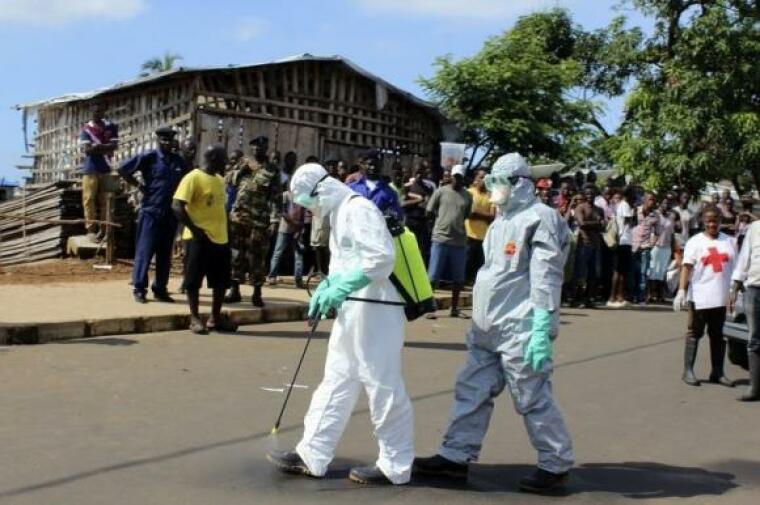Ebola News Today in Sierra Leone: Another British Health Worker Flown Home After 'Needle-Stick Injury'

Another British healthcare worker has reportedly been flown back to the U.K. after being suspected of contracting the Ebola virus, bringing the total number of returned health workers to six.
The possible infection happened after an accidental "needle-stick injury" at a treatment center in Sierra Leone in West Africa, BBC News reported on Friday.
The female British worker was the sixth to have apparently been infected with the virus after she accidentally pricked herself with a needle while caring for an Ebola patient. This is one of the most dangerous ways of getting the virus because the latter gets a direct access to the bloodstream.
This woman is now being cared for in the Royal Free Hospital in London.
Meanwhile, three other people have been discharged following their "close contact" with a British patient confirmed to have Ebola. Two were colleagues who were onboard the RAF plane carrying the patient on Thursday but were discharged later as there was no sign of Ebola in their bodies. Two more close contacts were flown to the Newcastle Royal Infirmary on Friday, of whom one has been discharged while the other one is still being tested.
The confirmed patient – a female army medic – was diagnosed to have contracted Ebola in Sierra Leone. She is now being cared for in a special isolation unit at the Royal Free Hospital in London, where two other British nurses infected with Ebola, identified as William Pooley and Pauline Cafferkey, were successfully treated.
According to The Telegraph, the patient was the third British health worker confirmed to have caught the Ebola virus whose current outbreak has already claimed 10,000 lives. The other two health workers fully recovered after being brought back to the U.K. for treatment.
"All appropriate support has, and will continue to be offered, to these six individuals. Our thoughts are with all the healthcare workers, and their families, affected at this time," Dr. Jenny Harries of Public Health England told BBC News.
"The U.K. has robust, well-developed and well-tested systems for managing Ebola. All appropriate infection control procedures continue to be followed to minimize any risk of transmission. There remains no risk to the general public's health and the overall risk to the U.K. continues to be very low," she added.
Sending the patient back to the U.K. offered the best chance of recovery, said Dr. Ben Neuman, a virologist at the University of Reading.
"The Royal Free Hospital has a 100 percent record in treating Ebola cases so far," Neuman added.
"While the new batch of ZMapp is not yet available, she could be treated with favipiravir, which has shown some early promising results in West African Ebola clinics. She may also be given antibody-rich serum from Ebola survivors to knock down the amount of virus in her blood while her immune system is learning to fight Ebola," the doctor said.
Between 600 to 700 U.K. defense personnel are based in Sierra Leone as part of the British military's aid mission in the country.
There have been 58 new confirmed cases reported in Sierra Leone in the first week of March this year, according to the Ebola Situation Report dated March 11 by the World Health Organization.
 Christians don't have to affirm transgenderism, but they can’t express that view at work: tribunal
Christians don't have to affirm transgenderism, but they can’t express that view at work: tribunal Archaeology discovery: Medieval Christian prayer beads found on Holy Island
Archaeology discovery: Medieval Christian prayer beads found on Holy Island Presbyterian Church in America votes to leave National Association of Evangelicals
Presbyterian Church in America votes to leave National Association of Evangelicals Over 50 killed in 'vile and satanic' attack at Nigerian church on Pentecost Sunday
Over 50 killed in 'vile and satanic' attack at Nigerian church on Pentecost Sunday Ukrainian Orthodox Church severs ties with Moscow over Patriarch Kirill's support for Putin's war
Ukrainian Orthodox Church severs ties with Moscow over Patriarch Kirill's support for Putin's war Islamic State kills 20 Nigerian Christians as revenge for US airstrike
Islamic State kills 20 Nigerian Christians as revenge for US airstrike Man who served 33 years in prison for murder leads inmates to Christ
Man who served 33 years in prison for murder leads inmates to Christ


 Nigerian student beaten to death, body burned over ‘blasphemous’ WhatsApp message
Nigerian student beaten to death, body burned over ‘blasphemous’ WhatsApp message 'A new low': World reacts after Hong Kong arrests 90-year-old Cardinal Joseph Zen
'A new low': World reacts after Hong Kong arrests 90-year-old Cardinal Joseph Zen Iran sentences Christian man to 10 years in prison for hosting house church worship gathering
Iran sentences Christian man to 10 years in prison for hosting house church worship gathering French Guyana: Pastor shot dead, church set on fire after meeting delegation of Evangelicals
French Guyana: Pastor shot dead, church set on fire after meeting delegation of Evangelicals ‘Talking Jesus’ report finds only 6% of UK adults identify as practicing Christians
‘Talking Jesus’ report finds only 6% of UK adults identify as practicing Christians Mission Eurasia ministry center blown up in Ukraine, hundreds of Bibles destroyed: 'God will provide'
Mission Eurasia ministry center blown up in Ukraine, hundreds of Bibles destroyed: 'God will provide' Church holds service for first time after ISIS desecrated it 8 years ago
Church holds service for first time after ISIS desecrated it 8 years ago Burger King apologizes for 'offensive campaign' using Jesus' words at the Last Supper
Burger King apologizes for 'offensive campaign' using Jesus' words at the Last Supper Uganda: Muslims abduct teacher, burn him inside mosque for praying in Christ’s name
Uganda: Muslims abduct teacher, burn him inside mosque for praying in Christ’s name